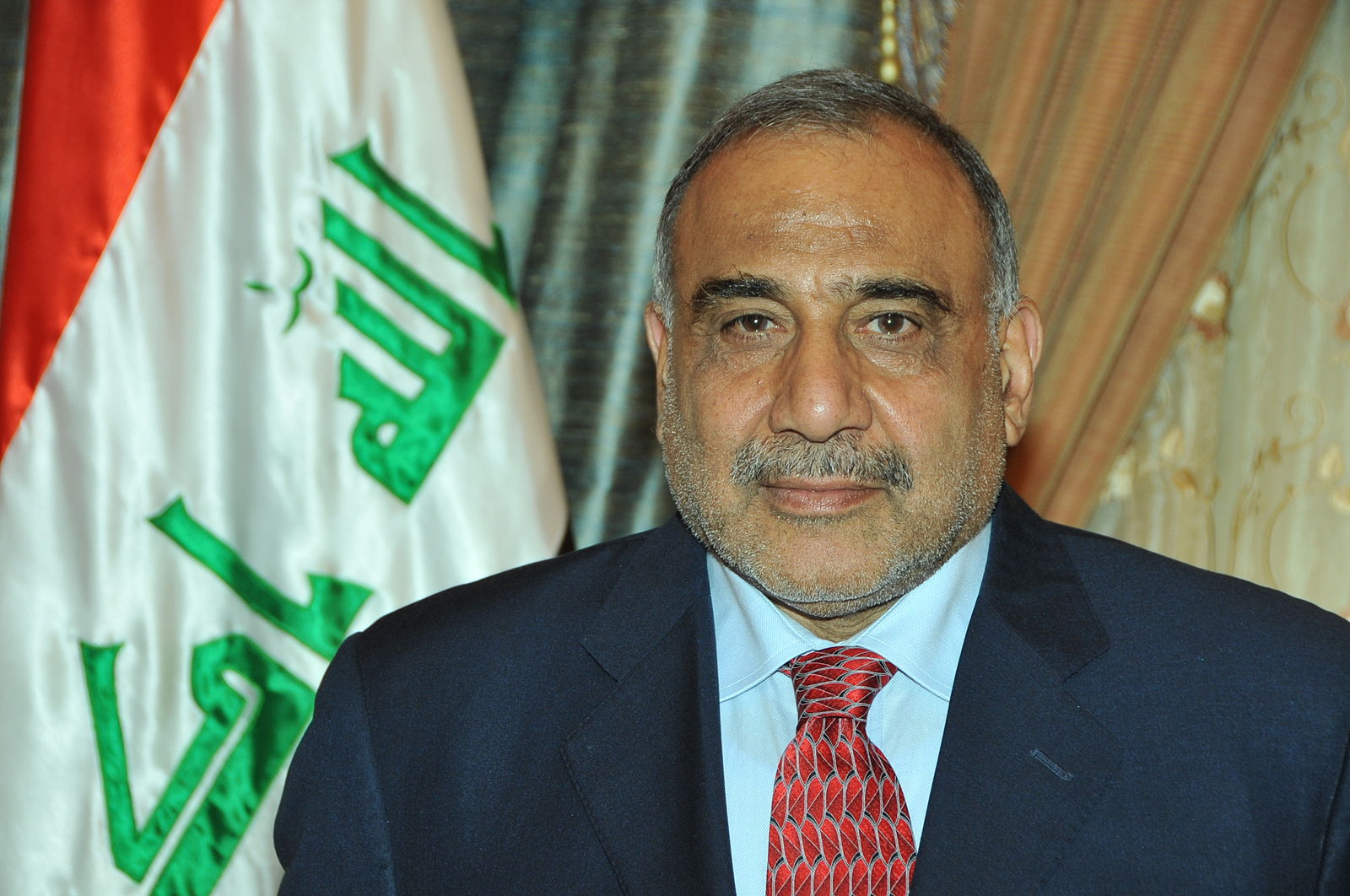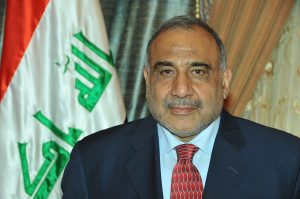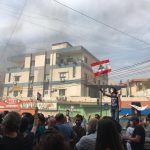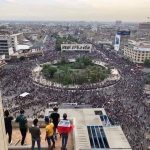By Giorgio Cafiero
On the final Friday of this month, chaotic unrest hit Baghdad. Renewed protests against Iraq’s government broke out and thousands of Iraqis crossed the Jumhuriyya Bridge connected to Baghdad’s Green Zone where the U.S. Embassy and many Iraqi government offices are located, resulting in a violent confrontation with soldiers. Two deaths were reported and 30 people were hospitalized after security forces fired live rounds and tear gas canisters in order to disperse thousands on the streets of Iraq’s capital.
Such turmoil followed nearly three weeks of relative calm after street protests began shaking Iraq earlier this month with tens of thousands of young Iraqis expressing their staunch opposition to their country’s post-2003 governance system. The citizen outrage witnessed across Iraq this month must be interpreted in a wider context throughout the greater Arab region as Algerian, Egyptian, Lebanese, Moroccan, and Sudanese citizens have similarly taken their grievances to the streets to protest their corrupt governments and state negligence.
Plagued by sectarianism and corruption, anger is widespread across Iraq. A common perception is that the country’s political elite have squandered the nation’s resources while failing to meet the needs of the average Iraqi. Many Iraqis reject the idea that especially high youth unemployment should be accepted, especially considering the country’s massive oil wealth. People in Iraq are fed up with their government and the poor quality of its services. Given that Iraq is one of the world’s most corrupt countries, such rage on the part of Iraqi youth should come as no surprise to any observer.
Although difficult to predict the longer-term impact of these protests across Baghdad and other Iraqi cities, it is fair to conclude that the “Arab Spring” has reached Iraq.
Brutal Force and Questions of Sectarianism
In response to the protests that began on October 1, Iraq’s authorities imposed curfews, shut off the internet, blocked roads, restricted the media, and deployed security forces across Baghdad. “The Iraqi authorities’ brazen use of excessive and lethal force against protesters in Baghdad and elsewhere must not be allowed to be swept under the rug,” according to Amnesty International’s Middle East Research Director, Lynn Maalouf. “The Iraqis have paid too high a price simply to be able to exercise their right to freedom of peaceful assembly.”
Instead of opening a dialogue, Prime Minister Adel Abdel-Mahdi’s government opted for trying to decisively crush the street protests. The Human Rights Office of the United Nationals Assistance Mission in Iraq (UNAMI) published a report on October 22 that documented at least 157 deaths and 5,494 injuries amid this month’s wave of unrest.
Many analysts are busy debating the role of sectarianism in the violence that has beset Iraq this month. Notwithstanding efforts on the part of some actors in Arab Gulf states to depict the violence in Iraq as Iranian-sponsored Shia oppression, most of those suffering from the brutal crackdown are Shia citizens who have taken a stand against a Shia-led political system.
Imad Harb explained, “Perhaps most shocking for the authorities, then and now, was that the ‘Shia street’ moved against what is practically a Shia-dominated political order, one sustained by deals and compromises among Shia politicians themselves.” Moreover, the unrest that Iraq has experienced this week has constituted a major challenge to Tehran. As Harb put it, “protests have sent a wrong message regarding Iranian prestige at a time the Islamic Republic is trying to rally its troops and affiliated militias in a serious confrontation with the United States and its Arab allies in the Gulf.”
Yet even if the street protestors are not motivated by sectarianism, it is clear that Iran’s influence in Iraq and the Baghdad government’s sectarian interests have contributed to growing anger over Iraq’s status quo. Many Iraqis, including Shia, are upset with the extent to which powerful non-state actors are not exclusively loyal to Baghdad as a result of their reliance on and indebtedness to Tehran. Iranian-sponsored Shia militias are not coming under the Iraqi government’s commands despite Mahdi’s efforts to achieve such an outcome, which goes to the heart of Iraq’s failure to establish a strong and functional state apparatus capable of asserting its sovereignty.
Put simply, Iraq is facing extremely difficult times. Officials in Baghdad need to begin a new chapter and implement major reforms, rather than just promise half-hearted measures that will almost inevitably fail to address severe socio-economic and political problems. As Iraq’s crisis in governance continues, there are countless reasons for people—both inside and outside of Iraq—to be concerned about new escalations of violence.
Regional Ramifications
While “Iraq goes to war with itself” (as the New York Times described the national situation), the regional stakes are high too. The negative consequences could be felt well beyond Iraq’s borders.
Prime Minister Mahdi’s trip to Jeddah last month was part of a grander effort aimed at positioning Baghdad to serve as a diplomatic bridge between the Saudi kingdom and the Islamic Republic. Most likely, the Pakistani Prime Minister’s recent visit to Tehran suggests that Islamabad—not Baghdad—will be taking a lead in terms of attempting to push Saudi Arabia and Iran away from dangerous brinkmanship. Without a doubt, the more Iraq destabilizes internally, the less its leadership will be able to do regionally in the interest of promoting a de-escalation between its neighbors.
Nonetheless, Iraq’s problems will increase multifold if any conflict involving Iran breaks out in the Middle East. With Iranian-sponsored Shia militias as well as U.S. military forces in Iraq, if any such war erupts in the future, it would likely be fought, at least in part, on Iraqi soil. With the majority of Iraqi citizens having experienced little besides sanctions, occupation, and war, the country needs rehabilitation from violence that has shaped the society in countless ways. Any conflict involving Iran will severely dim such prospects for many years, if not decades.
A brighter chapter for Iraq will require regional peace, improvements in Baghdad’s relations with all of its neighbors—including Jordan, Iran, Syria, Turkey, and Gulf Cooperation Council (GCC) member-states—and an overhauling of Iraq’s entire political system. Improving government institutions and making them capable of meeting the demands of a war-torn population, taking a stand against corruption, and establishing the rule of law are essential.
Although Iraqis have been protesting—in various forms—since 2003 in favor of better governance, what we learned this month is that Iraqis are running out of patience. Without massive reforms and fundamental changes in terms of Baghdad’s political system, the mass protests that have been rocking Baghdad, Basra, Najaf, and other Iraqi cities will continue without any known path forward. A nightmare scenario would entail protestors grabbing weapons to arm themselves against the state in ways that could be all too reminiscent of Syria’s fall into mayhem in 2011/2012.






JRH
2 million Koreans protested last week in front of the Justice Ministry against corruption, nepotism, influence peddling, absence of rule of law, and the class divisions inside the country, with mercantile princelings and politicians’ offspring on one side and the Korean people on the other side.
Per capita income is $ 38,000 per year in that US satrapi.
US media is completely silent about that.
Long live Free & United Korea!